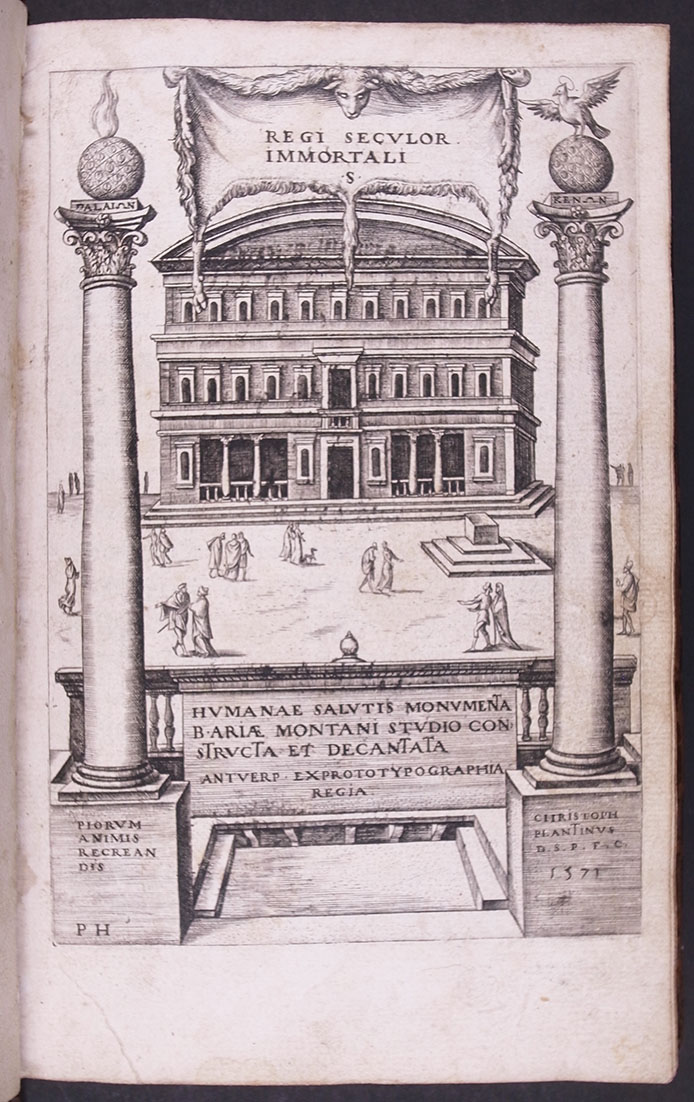At the initiative of its honorary chairman baron Piet Van Waeyenberge, the De Eik investment company has developed an important collection of manuscripts and rare books since the 1990s. The core of the Cultura Fonds Library was formed by the acquisition in 1991 en bloc of 510 copies of books printed or published by Christophe Plantin (c. 1520–1589), who was one of the most important merchants active in the book trade in the West during the second half of the sixteenth century.
Successive curators have contributed continuously to the expansion of the collection through the acquisition of important, rare or even unique copies related to the Officina Plantiniana as well as works and sources more broadly illustrating the culture of the former Low Countries. Highlights include Plantin’s first printing, a bilingual edition of La institutione di una fanciulla nata nobilmente (Antwerp, 1555, on the account of Jean Bellère), the Antwerp Polyglot Bible (8 vols, Antwerp 1568–1572), and the famous emblem book by Benito Arias Montano, Humanae salutis monumenta (Antwerp, 1572).
Although the collection remains in private hands, Cultura Fonds Library welcomes researchers and interested public in the pursuit to illuminate, disseminate and valorise its patrimony for the society at large.
A century of typographic excellence
A little over a year ago, the Mazarine Library in Paris, with the treasure gathered in the Cultura Fonds collection, exhibited the most representative works of the genius of Christophe Plantin on the fifth centenary of his birth. A native of Touraine, trained in bookbinding, Plantin settled around 1549 in Antwerp, which was already an important center of international trade. In 1555, he laid the foundations of the largest printing press known during the Old Regime in Europe: his Plantinian Office, which operated until 1876, when Edward Moretus sold it to the city of Antwerp.
"The first century of activity of the Plantin-Moretus printing house was especially brilliant, its editorial strategies and the requirements for its production are at the heart of this exhibition," indicated the host institution in Paris, which today exhibits the works virtually, most representative on its website [2]. It shows how Christophe Plantin and his successors transformed the aesthetic of the Renaissance book and ushered in the baroque era of page layout by arranging novel typographical and decorative materials, promoting illustration with copper engravings, favorably appealing to the painter Peter Paul Rubens or talented illustrators and engravers (Pieter van der Borcht and the Wierix brothers, Charles de Mallery or Cornelis Galle). In this golden age, the Plantinian press published more than 5,000 editions, combining visual appeal with legibility and efficiency.»
Its owner, a bibliophile at heart
Piet Paul August Van Waeyenberge (1938), Baron [3], born in Ghent, is a Flemish Belgian businessman active in the agri-food sector with significant investments in Paraguay and other Latin American countries.
Graduated in Business and Financial Sciences, he has carried out an extensive activity dedicated to cultural heritage, even creating an important library that, among other topics, addresses the following topics: Travelers, Paraguay, Jesuits, Flemish and the Netherlands, and the "Plantinian" editions; in addition to its collection of old cartography referring especially to Paraguay. Precisely in allusion to the works -books and maps- gathered around this country, last September the prestigious Association Internationales de Bibliophilie (International Association of Bibliophiles) held a meeting in Gaasbeek, referring exclusively to the Paraguayan library of Van Waeyenbergue, with materials ranging from the 17th century to the present. Former honorary consul of the Republic of Paraguay in Belgium, Piet Van Waeyenberge received the decoration of the National Order of Merit "Don Benito Falcón" for his extraordinary and exceptional services. [4]
Piet Van Waeyenberge receives from the Minister of Foreign Relations of Paraguay, Dr. Euclides Acevedo, the decoration of the National Order of Merit "Don José Falcón" on March 9, 2022.
His human warmth and extensive knowledge of American bibliophile make Baron Van Waeyenberge a specialist of recognized international prestige.
Notes:
1. For more information, researchers can ask us for the email of Dr. Joran Proot.
2. Online: SEE
3. His Majesty King Albert II of Belgium elevated him to the rank of baron in 1995. his motto is Wees Uzelf (Be yourself).
4. In the cultural space, the Paraguayan government highlighted the support applied to the dissemination of Paraguayan culture and music, especially the works of Agustín Barrios Mangoré. Likewise, their solidarity action with Chaco communities was valued, especially in Pa'i Puku, where education is taught to low-income children and adolescents, inspired by the pastoral work carried out by the Belgian missionary priest Monsignor Pedro Shaw (died in 1984). , affectionately called Pa'i Puku, today in the process of beatification.
* Special for Hilario. Arts Letters Trades

